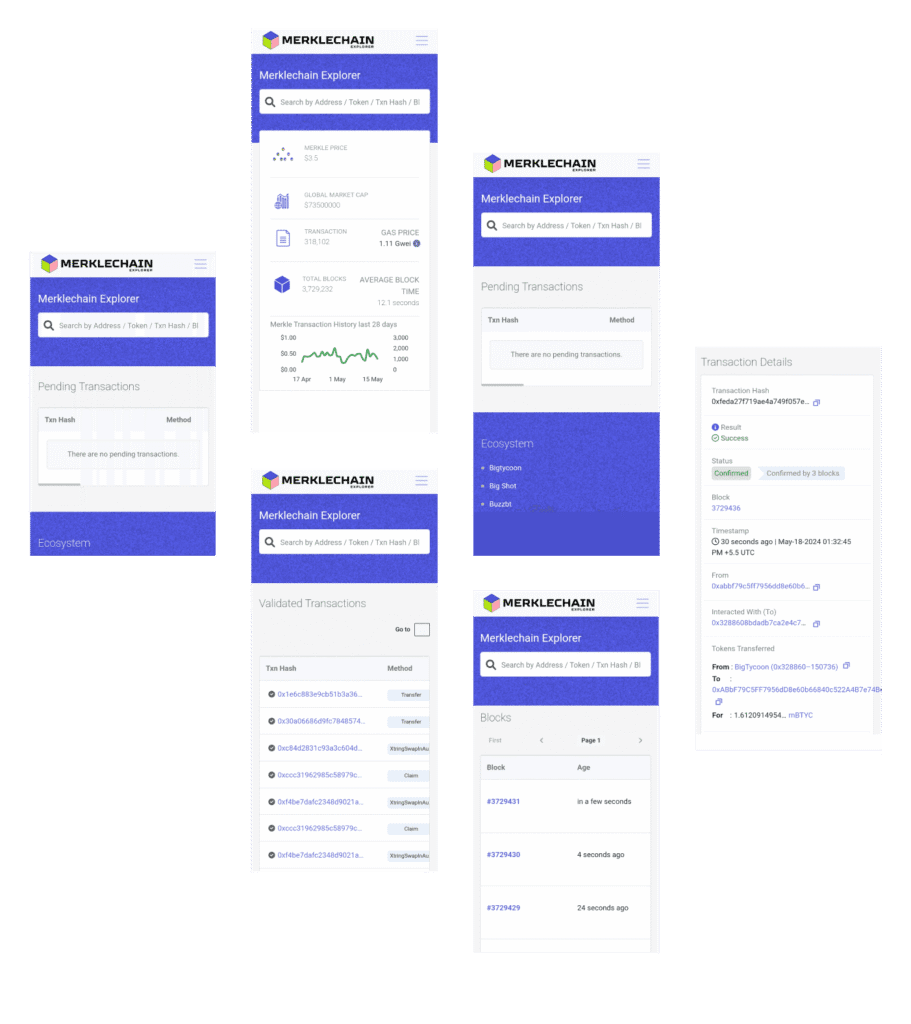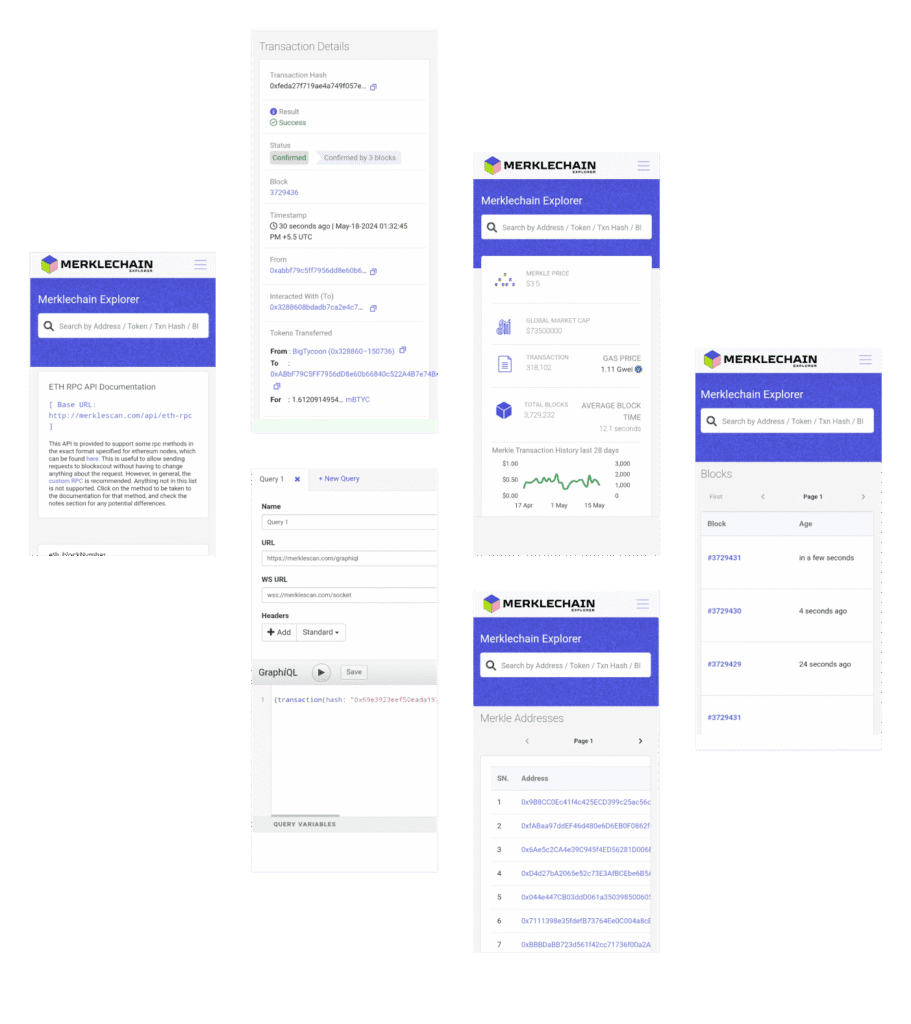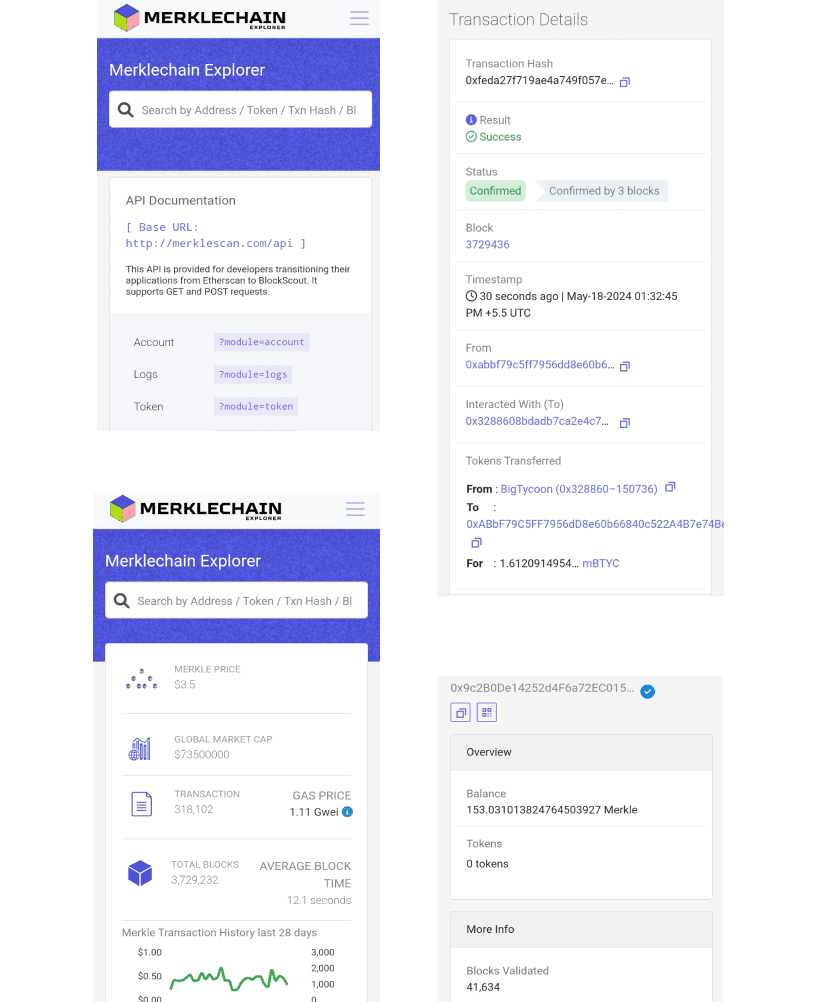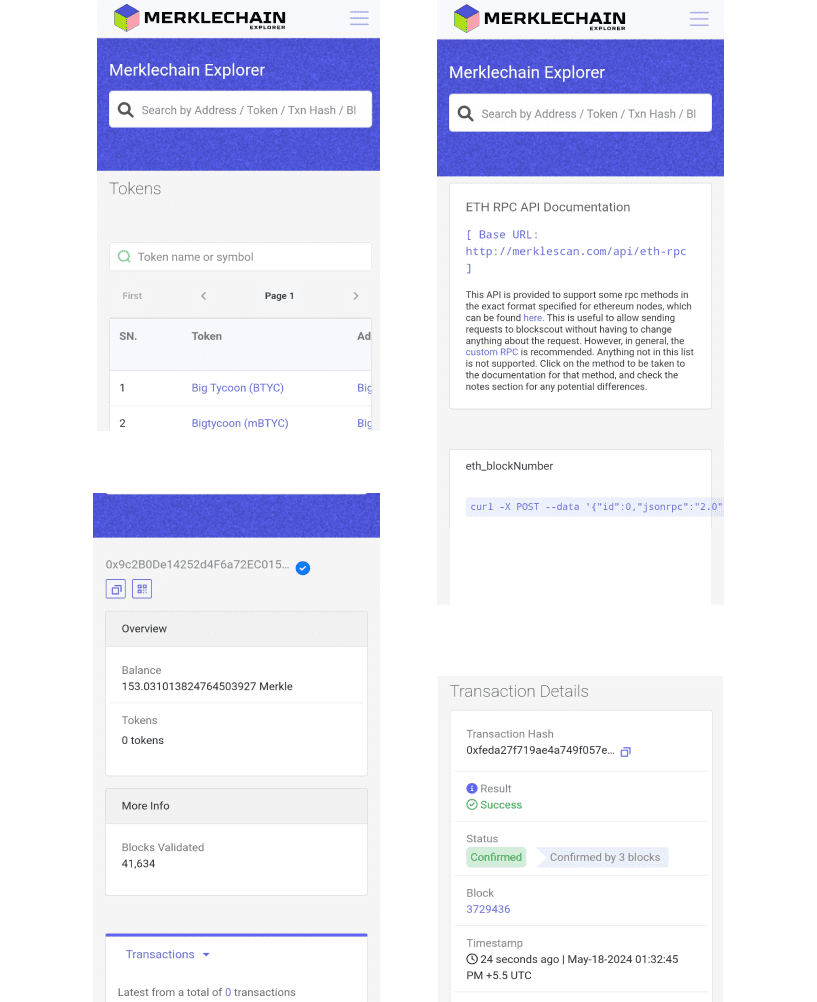
Future Smart Chain ecosystem
Merkle Scan Explorer is a blockchain explorer for Future Smart Chain, a network known for its high transaction-per-second (TPS) capabilities. The explorer provides users with real-time insights into transactions, blocks, and smart contracts, promoting transparency and ease of use within the blockchain ecosystem. It features advanced search, detailed analytics, and a user-friendly interface.

Get Started with this product
Provides up-to-the-second data on all transactions happening within the Future Smart Chain, ensuring users have immediate access to the latest blockchain activity.
Designed to handle the high transaction volumes of the Future Smart Chain, ensuring smooth performance without lags or downtime, even during peak times.
Offers comprehensive analytics and visualizations for each block, including transaction counts, miner information, and timestamps, providing deep insights into blockchain operations.
Enables users to track the activity and status of smart contracts deployed on the Future Smart Chain, promoting transparency and accountability.
Allows users to search for specific transactions, wallet addresses, blocks, and smart contracts quickly and efficiently, enhancing the ease of navigation and information retrieval.
Provides advanced filtering options to narrow down search results based on specific criteria such as transaction type, value, or date, improving data accessibility.
Displays key metrics about the network’s health, including node performance, transaction throughput, and consensus status, helping users understand the overall state of the blockchain.
Features an intuitive and clean design that caters to both novice and advanced users, ensuring a seamless experience while exploring blockchain data.
Real-Time Data and High TPS Support:
The client required Merkle Scan Explorer to provide real-time tracking of transactions, blocks, and automated blockchain agreements on the Future Smart Chain. Given the chain’s high transaction-per-second (TPS) capability, the explorer needed to manage large volumes of data without delay, ensuring users had instant access to the latest blockchain activities. This called for highly efficient data processing and retrieval systems to maintain speed, accuracy, and reliability.
User-Friendly Interface with Advanced Functionality: A key requirement was an intuitive, user-friendly interface that caters to both novice and advanced users. The explorer needed to feature advanced search and filtering capabilities, allowing users to easily find specific transactions, addresses, and blocks. Additionally, it had to provide detailed analytics and visualizations of blockchain data, offering comprehensive insights and making complex data accessible and understandable.
Robust Security and Data Accuracy: Ensuring the accuracy and reliability of the data displayed by Merkle Scan Explorer was paramount. The client emphasized the need for robust security measures to protect against data tampering and unauthorized access. This included implementing SSL encryption, secure data handling practices, and regular audits. Maintaining data integrity was crucial to fostering trust among users and establishing the explorer as a dependable tool for the Future Smart Chain ecosystem.

Validators are chosen to create new blocks and validate transactions based on the number of tokens they hold and are willing to “stake” as collateral, ensuring energy efficiency and security.
Token holders vote for delegates who validate transactions and create blocks. This mechanism enhances scalability and reduces centralization by distributing validation authority across multiple elected nodes.
Ensures consensus despite potential faults or malicious nodes. Validators must agree on the order and validity of transactions, providing a secure and robust mechanism suitable for high TPS environments.
Transactions are processed off-chain before being recorded on the main blockchain, reducing the load and enhancing transaction speed while maintaining security and decentralization.
The blockchain is divided into smaller, manageable pieces called shards. Each shard processes its own transactions and Smart Contracts, significantly increasing the network’s transaction processing capability and overall efficiency.
Combines multiple consensus mechanisms, such as PoS and BFT, to leverage the strengths of each. This approach enhances security, scalability, and transaction speed, catering to the high TPS requirements of Future Smart Chain.
Visual identity and design elements
Primary font family and usage

Brand colors
#504dd8
#b1e410
#ffa2b1
Project Approach: The development of Merkle Scan Explorer began with extensive research into user needs and the capabilities of existing blockchain explorers. This initial phase helped define core functionalities and user expectations. A detailed project roadmap was created, including timelines, milestones, and deliverables. The development process followed an agile methodology, involving iterative design and frequent feedback sessions with the client to ensure all features aligned with their vision. The backend architecture was engineered for real-time data handling, scalability, and advanced search functions. Meanwhile, the frontend emphasized ease of use, clean design, and seamless navigation to improve user engagement. Collaboration between developers, designers, and stakeholders was consistent throughout the project. Rigorous testing—including performance, functionality, and security tests—was conducted to guarantee accuracy, stability, and the ability to manage high TPS demands typical of blockchain networks.
Results: The successful deployment of Merkle Scan Explorer marked a significant milestone for users of the Future Smart Chain. The tool allowed comprehensive access to blockchain data, supporting features like real-time transaction tracking, wallet histories, and block analytics. Its intuitive user interface received praise from both novice and experienced users, who found the explorer easy to navigate and visually informative. The backend demonstrated excellent performance under high transaction loads, ensuring uninterrupted access to live data without delays. User feedback consistently emphasized the platform’s speed, accuracy, and usability. Continuous updates and system monitoring were implemented to maintain top-tier performance and adapt to evolving user needs. As a result, Merkle Scan Explorer has become a trusted resource in the Future Smart Chain ecosystem, enhancing transparency, engagement, and trust within the growing blockchain community.

Ensuring the Merkle Scan Explorer could process and display high transaction volumes without performance issues was critical. This required optimizing data retrieval and presentation methods to keep pace with the rapid transaction speeds of the Future Smart Chain, preventing slowdowns, ensuring responsiveness, and maintaining smooth user experiences even during network spikes.
Maintaining accurate, reliable data display required robust mechanisms for real-time blockchain synchronization and validation. Continuous monitoring, automated error detection, and verification processes ensured all presented information precisely matched the actual state of the chain, preventing misinformation and building user trust in the explorer’s output during heavy network activity or unexpected disruptions.
The explorer was designed to scale efficiently with the growing Future Smart Chain ecosystem. This meant creating a flexible architecture capable of handling larger datasets, higher transaction throughput, and increasing user interactions without sacrificing speed, stability, or reliability, ensuring long-term performance under significantly expanded loads in future development and adoption phases.
Designing the interface required balancing simplicity for new users with powerful tools for experts. Iterative testing, feedback loops, and refinements helped achieve an accessible yet feature-rich explorer. The result was a platform offering intuitive navigation, advanced analytics, and customizable viewing, meeting diverse user needs without overwhelming or alienating less experienced audiences.

This technology stack ensures that Merkle Scan Explorer is robust, scalable, and capable of providing users with accurate and real-time insights into the Future smart chain blockchain.





